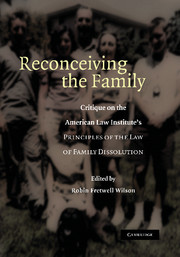 Reconceiving the Family
Reconceiving the Family Book contents
- Frontmatter
- Contents
- Acknowledgments
- Foreword, by Mary Ann Glendon
- List of Contributors
- Introduction
- PART ONE FAULT
- PART TWO CUSTODY
- PART THREE CHILD SUPPORT
- PART FOUR PROPERTY DIVISION
- 8 The ALI Property Division Principles: A Model of Radical Paternalism?
- 9 Unprincipled Family Dissolution: The ALI's Recommendations for Division of Property
- 10 You and Me against the World: Marriage and Divorce from Creditors' Perspective
- PART FIVE SPOUSAL SUPPORT
- PART SIX DOMESTIC PARTNERSHIP
- PART SEVEN AGREEMENTS
- PART EIGHT JUDICIAL AND LEGISLATIVE PERSPECTIVES
- PART NINE INTERNATIONAL REFLECTIONS
- Afterword: Elite Principles: The ALI Proposals and the Politics of Law Reform, by Carl E. Schneider
- Index
8 - The ALI Property Division Principles: A Model of Radical Paternalism?
Published online by Cambridge University Press: 25 January 2010
- Frontmatter
- Contents
- Acknowledgments
- Foreword, by Mary Ann Glendon
- List of Contributors
- Introduction
- PART ONE FAULT
- PART TWO CUSTODY
- PART THREE CHILD SUPPORT
- PART FOUR PROPERTY DIVISION
- 8 The ALI Property Division Principles: A Model of Radical Paternalism?
- 9 Unprincipled Family Dissolution: The ALI's Recommendations for Division of Property
- 10 You and Me against the World: Marriage and Divorce from Creditors' Perspective
- PART FIVE SPOUSAL SUPPORT
- PART SIX DOMESTIC PARTNERSHIP
- PART SEVEN AGREEMENTS
- PART EIGHT JUDICIAL AND LEGISLATIVE PERSPECTIVES
- PART NINE INTERNATIONAL REFLECTIONS
- Afterword: Elite Principles: The ALI Proposals and the Politics of Law Reform, by Carl E. Schneider
- Index
Summary
This chapter addresses the ALI's proposals regarding property division upon dissolution. Consideration of this single well-worn subject might at first glance appear to be a fairly routine exercise. After all, there are currently a great many books, written for the edification of practicing lawyers, that treat various aspects of the subject of property division at divorce, together with a number of treatises, outlines, and handbooks for students that deal with the subject, and a slew of law review articles dissecting myriad issues relating to property distribution that defy classification or accurate numbering. Anyone who takes comfort from the fact that this glut of material exists to address the subject of property division is in for a rude and dismaying awakening when first confronting the Principles recommended by the ALI.
The Principles are set out in a volume that consists of more than a thousand pages of text. Concededly, a reader's focus on any number of provisions in any single chapter, including many of those in the property division chapter, will aid the reader's comprehension of the subject matter that the provision purports to address. At the same time, however, there are critical and often complex relationships between the property division chapter and several other chapters of the Principles. The reader who devotes his or her attention only to the property division principles will surely fail to see a number of snakes hiding in the tall grasses of other provisions.
- Type
- Chapter
- Information
- Reconceiving the FamilyCritique on the American Law Institute's Principles of the Law of Family Dissolution, pp. 163 - 175Publisher: Cambridge University PressPrint publication year: 2006


